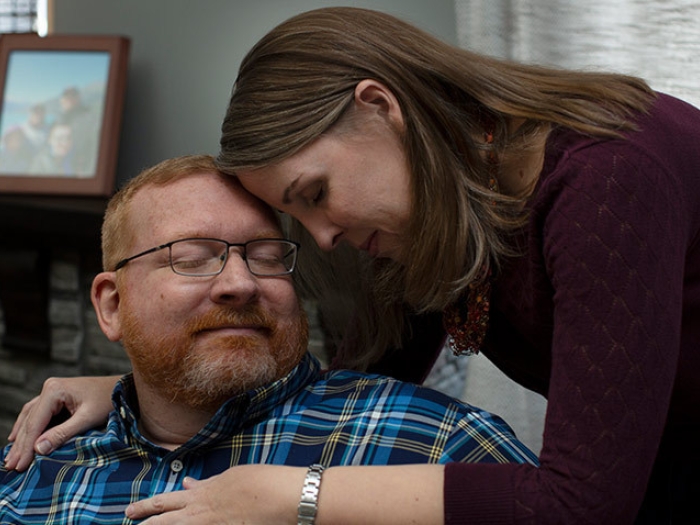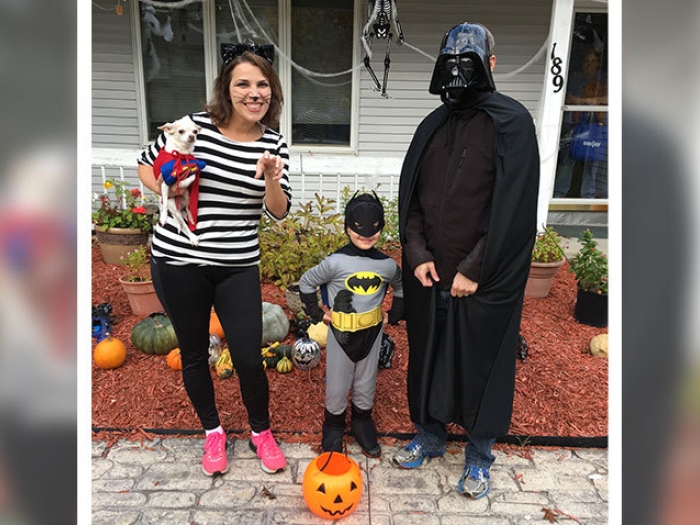Whether cancer is found in the rectum or the colon makes a big difference in the risk it poses and how it’s treated. What you need to know to get the right diagnosis.
7:00 AM
Author |

The terms "colon cancer" and "colorectal cancer" tend to be used interchangeably. But there are important differences between colon and rectal cancers.
Less common and potentially more dangerous, rectal cancer calls for special expertise to properly diagnose and treat it.
LISTEN UP: Add the new Michigan Medicine News Break to your Alexa-enabled device, or subscribe to our daily audio updates on iTunes, Google Play and Stitcher.
Karin Hardiman, M.D., Ph.D., surgical director of the Rogel Cancer Center's Multidisciplinary Colorectal Cancer Clinic, discusses the unique challenges of rectal cancer and the importance of colorectal screening.
Location of the colorectal cancer matters
The rectum is the last 12 centimeters of the large intestine. "It's not easy to see where one ends and the other begins," Hardiman says. "It takes specialized training and lots of experience to tell whether a cancer is in the colon or the rectum."
Why does it matter? "The rectum doesn't have the same protective outer layer (called the serosa) as the colon, so it's easier for a tumor to break through and spread locally," Hardiman says. "That makes rectal cancer 10 times more likely than colon cancer to come back after treatment where it started."
MORE FROM MICHIGAN: Sign up for our weekly newsletter
Rectal cancer has about a 20 percent risk of local recurrence, versus about 2 percent with colon cancer.
Rectal cancer that grows or spreads in the pelvic area is especially dangerous because of the important organs located nearby. Depending on the size and position of the tumor, rectal cancer can pose a threat to essential bodily functions, from bowel movements to urination to sex.
Cancer treatment strategies differ
When rectal cancer is identified before symptoms develop, the treatment priority is lowering the risk of local growth and spread. A rectal cancer is considered "locally advanced" when an ultrasound or MRI confirms it has grown through the bowel wall into the tissue around the rectum, or there is evidence of nearby lymph node involvement.
"At this stage, the strategy is to begin with chemotherapy or targeted radiation to shrink the tumor," Hardiman says. "An expert surgeon can then remove the radiated part of the rectum and often reconnect the adjacent parts of the bowel. This approach has been shown to be the best for maintaining surrounding organ function.
"Tumors located farther up in the colon pose less risk to nearby organs, so with a different diagnosis, we typically start with surgery. Patients may also need chemotherapy to kill any remaining cancer cells," says Hardiman. "That's why it's important to choose a center with advanced imaging technologies and expertise to guide diagnosis and staging—and surgeons with the specialized training to perform rectal surgery, which is far more delicate and complex than colon surgery."
SEE ALSO: A Team Approach and Clinical Trials Push Rectal Cancer Care Forward
Treatment for more advanced rectal cancer, involving large tumors and tumors that have grown into or spread to other organs, may require additional specialists such as gynecologic, urologic, liver, spine and plastic surgeons. A multidisciplinary team in a high-volume center can remove tumors that would have been considered inoperable for a colorectal surgeon alone, while preserving organ function and quality of life.
Cancer screening is paramount
Regardless of whether cancer is found in the colon or the rectum, the best chance at successful treatment is finding it early, before symptoms develop.
Colonoscopy, the "gold standard" of colorectal screening, is highly effective at early detection of cancer anywhere in the large bowel. Colonoscopy can find suspicious polyps and guide their removal, preventing 90 percent of colorectal cancers.
"It's so important to get the word out about screening," Hardiman says.
SEE ALSO: Colorectal Cancer Screening Might Need to Start Sooner Than You Thought
Hardiman emphasizes that the best outcomes result from acting early and working with an experienced team.
Her tips:
-
Know your existing colorectal cancer risk, and become familiar with the latest screening guidelines.
-
Regardless of your age, if you experience symptoms such as bleeding, abdominal pain or a change in bowel habits, see your doctor right away.
-
If screening reveals cancer in the lower part of the colon, ask whether or how your doctor has determined if it is in the colon or in the rectum. If there is any question, request additional imaging or seek a second opinion.
-
Choose an experienced surgeon who performs a high volume of both colon and rectal cancer procedures.
-
If possible, choose a treatment center with multidisciplinary colorectal cancer care experience.
-
Make sure your cancer care team follows the treatment guidelines published by the National Comprehensive Cancer Network.
For questions about colon or rectal cancer or to schedule an appointment, call the Cancer AnswerLine at 800-865-1125.

Explore a variety of healthcare news & stories by visiting the Health Lab home page for more articles.

Department of Communication at Michigan Medicine
Want top health & research news weekly? Sign up for Health Lab’s newsletters today!





